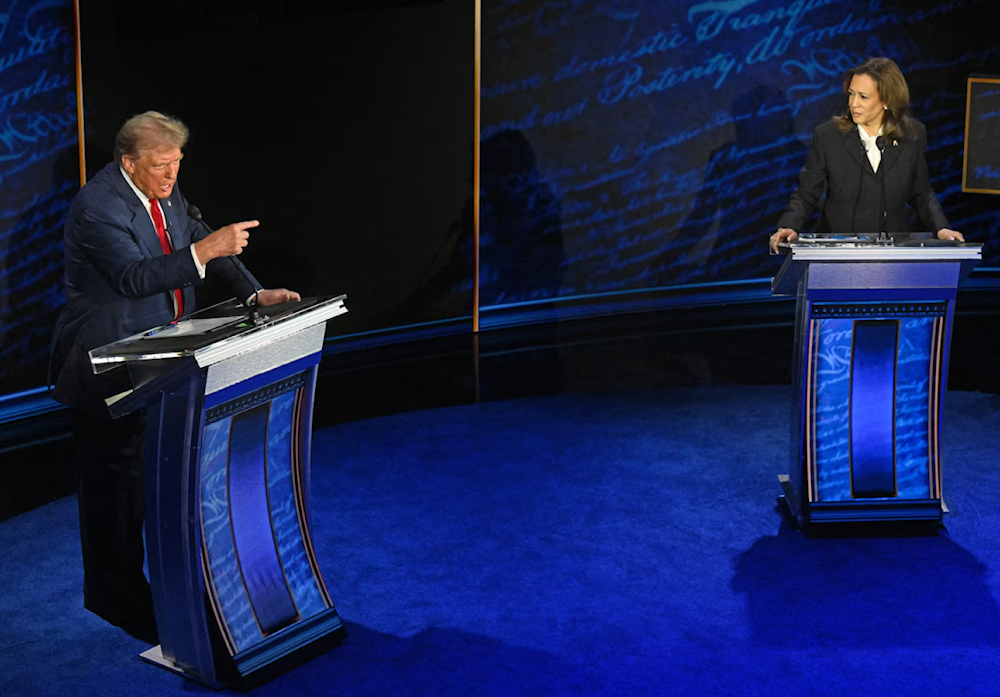The Guardian reveals tech bosses who poured $394mln into US election
The tech industry is heavily influencing US politics, with tech moguls leveraging Super PACs to contribute unlimited funds.
-

Vice President Kamala Harris and Donald Trump speak during an ABC News presidential debate in Philadelphia, on September 10, 2024. (AFP)
Silicon Valley tech industry figures donated over $394 million to the 2024 US presidential election, with Elon Musk contributing the largest share of $242.6 million to Donald Trump's campaign, The Guardian revealed.
Other major donors included venture capitalists and tech founders like Marc Andreessen ($5.5 million) and Jan Koum ($5.1 million). On the other side, Kamala Harris also garnered significant support, receiving $51.1 million from Facebook co-founder Dustin Moskovitz, $17 million from LinkedIn co-founder Reid Hoffman, and $11.7 million from cryptocurrency entrepreneur Chris Larsen, highlighting the growing influence of the tech industry in US elections.
The FEC filings reveal the considerable impact of tech money on US politics, with millions being funneled into Washington as companies seek to shape government policy and regulations. Political donations in the US are complex and opaque, with wealthy donors finding ways to contribute without full public disclosure.
These contributions can take various forms, including direct donations to campaigns (capped at $3,300 per candidate), donations to political action committees (PACs), and, most notably, contributions to Super PACs. Established after the 2010 Supreme Court decision Citizens United v. FEC, Super PACs allow unlimited donations from individuals and corporations to fund political advertising, though they cannot directly contribute to campaigns.
This has allowed figures like Elon Musk to donate large sums, such as the $242.6 million he contributed to Trump’s campaign. Tech moguls, including Musk, are increasingly using these channels to exert influence, driven not only by ideology but also by business interests. Musk and other wealthy Trump supporters are particularly motivated by the 2017 tax cuts, which benefited the wealthy and corporations, and are set to expire in 2025; raising the stakes for tech billionaires to back Trump due to his pro-business policies.
Trump's administration has granted Musk and other donors high-level access, with Musk’s $242.6 million donation securing his role co-heading the "Department of Government Efficiency." This marks a shift for Musk, who had criticized Trump just two years earlier, reflecting a broader trend among Silicon Valley billionaires like Marc Andreessen and Doug Leone, who reversed their criticisms and donated to Trump’s campaign despite past opposition.
Silicon Valley's ideological shift reflects a growing desire among tech leaders to influence policy, particularly around emerging sectors like cryptocurrency and AI, which are less regulated and, in turn, allow it to be heavily involved in shaping the political landscape.
The crypto industry has become a major political contributor in the 2024 election cycle, surpassing other sectors. It notably influenced congressional races, spending $40 million to challenge Democratic Ohio Senator Sherrod Brown. Trump, once skeptical of crypto, has embraced it, becoming the first presidential candidate to accept Bitcoin donations. Chris Larsen, chairman of Ripple, donated at least $11.7 million to Harris after she pledged support for the industry.
"She knows people who have grown up in the innovation economy," Larsen remarked in October of Harris. "I think she gets it at a fundamental level, in a way that I think the Biden folks were just not paying attention to."
Lisa Gilbert, co-president of Public Citizen, stated that crypto proponents were "willing to hedge their bets and play both sides." "In any individual race where they thought one candidate was the crypto candidate, they weighed in heavily and often got real results."
Gilbert highlighted that non-profit donations, which are not subject to disclosure, represent a significant and opaque avenue for political giving, contributing to the broader issue of excessive, undisclosed money in US politics, as demonstrated by Bill Gates' $50 million donation to Kamala Harris' campaign, which was made through a non-profit and therefore not disclosed in FEC data.

 4 Min Read
4 Min Read








